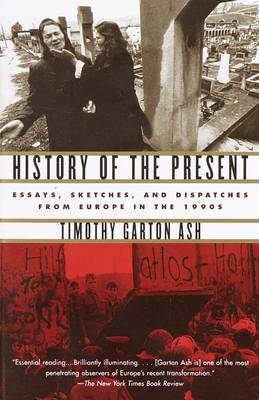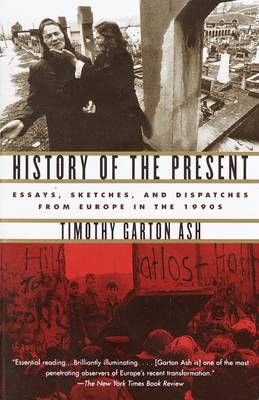
- Retrait gratuit dans votre magasin Club
- 7.000.000 titres dans notre catalogue
- Payer en toute sécurité
- Toujours un magasin près de chez vous
- Retrait gratuit dans votre magasin Club
- 7.000.0000 titres dans notre catalogue
- Payer en toute sécurité
- Toujours un magasin près de chez vous
History of the Present
Essays, Sketches, and Dispatches from Europe in the 1990s
Timothy Garton Ash
Livre broché | Anglais
22,45 €
+ 44 points
Description
The 1990s. An extraordinary decade in Europe. At its beginning, the old order collapsed along with the Berlin Wall. Everything seemed possible. Everyone hailed a brave new Europe. But no one knew what this new Europe would look like. Now we know. Most of Western Europe has launched into the unprecedented gamble of monetary union, though Britain stands aside. Germany, peacefully united, with its capital in Berlin, is again the most powerful country in Europe. The Central Europeans--Poles, Czechs, Hungarians--have made successful transitions from communism to capitalism and have joined NATO. But farther east and south, in the territories of the former Soviet Union and the former Yugoslavia, the continent has descended into a bloody swamp of poverty, corruption, criminality, war, and bestial atrocities such as we never thought would be seen again in Europe.
Timothy Garton Ash chronicles this formative decade through a glittering collection of essays, sketches, and dispatches written as history was being made. He joins the East Germans for their decisive vote for unification and visits their former leader in prison. He accompanies the Poles on their roller-coaster ride from dictatorship to democracy. He uncovers the motives for monetary union in Paris and Bonn. He walks in mass demonstrations in Belgrade and travels through the killing fields of Kosovo. Occasionally, he even becomes an actor in a drama he describes: debating Germany with Margaret Thatcher or the role of the intellectual with Václav Havel in Prague. Ranging from Vienna to Saint Petersburg, from Britain to Ruthenia, Garton Ash reflects on how "the single great conflict" of the cold war has been replaced by many smaller ones. And he asks what part the United States still has to play. Sometimes he takes an eagle's-eye view, considering the present attempt to unite Europe against the background of a thousand years of such efforts. But often he swoops to seize one telling human story: that of a wiry old farmer in Croatia, a newspaper editor in Warsaw, or a bitter, beautiful survivor from Sarajevo.
His eye is sharp and ironic but always compassionate. History of the Present continues the work that Garton Ash began with his trilogy of books about Central Europe in the 1980s, combining the crafts of journalism and history. In his Introduction, he argues that we should not wait until the archives are opened before starting to write the history of our own times. Then he shows how it can be done.
Timothy Garton Ash chronicles this formative decade through a glittering collection of essays, sketches, and dispatches written as history was being made. He joins the East Germans for their decisive vote for unification and visits their former leader in prison. He accompanies the Poles on their roller-coaster ride from dictatorship to democracy. He uncovers the motives for monetary union in Paris and Bonn. He walks in mass demonstrations in Belgrade and travels through the killing fields of Kosovo. Occasionally, he even becomes an actor in a drama he describes: debating Germany with Margaret Thatcher or the role of the intellectual with Václav Havel in Prague. Ranging from Vienna to Saint Petersburg, from Britain to Ruthenia, Garton Ash reflects on how "the single great conflict" of the cold war has been replaced by many smaller ones. And he asks what part the United States still has to play. Sometimes he takes an eagle's-eye view, considering the present attempt to unite Europe against the background of a thousand years of such efforts. But often he swoops to seize one telling human story: that of a wiry old farmer in Croatia, a newspaper editor in Warsaw, or a bitter, beautiful survivor from Sarajevo.
His eye is sharp and ironic but always compassionate. History of the Present continues the work that Garton Ash began with his trilogy of books about Central Europe in the 1980s, combining the crafts of journalism and history. In his Introduction, he argues that we should not wait until the archives are opened before starting to write the history of our own times. Then he shows how it can be done.
Spécifications
Parties prenantes
- Auteur(s) :
- Editeur:
Contenu
- Nombre de pages :
- 496
- Langue:
- Anglais
Caractéristiques
- EAN:
- 9780375727627
- Date de parution :
- 11-09-01
- Format:
- Livre broché
- Format numérique:
- Trade paperback (VS)
- Dimensions :
- 132 mm x 204 mm
- Poids :
- 371 g

Les avis
Nous publions uniquement les avis qui respectent les conditions requises. Consultez nos conditions pour les avis.






